牛津译林版-英语-八上-5单元 语法讲解:may和might的用法1
(完整版)may与might的用法区别

may与might的用法区别一、表示允许注意以下两种情况。
如:1. 表示请求允许(即请求别人允许自己做某事),两者都可用,只是might 表示的语气较委婉(但并不表示过去)。
如:May [Might] I sit here? 我可以坐在这里吗?I wonder if I might ask you a favor? 不知能否请你帮个忙?I’d like to ask a question if I may. 如果可以的话,我想提个问题。
2. 表示给予允许(即自己允许别人做某事),通常要用may而不用might。
如:You may come in now. 你现在可以进来了。
You may not tell him this. 你不可以告诉他这件事。
体会以下对话的问句与答句。
如:A:May [Might] I stay? 我可以留下吗? (表请求,可用两者)B:Yes, you may. 可以。
(表允许,不能用might)注:在通常情况下,may 表示允许(请求允许或给予允许)时,总是针对“现在”或“将来”而言,若要表示已经给予或已经存在的允许,则通常不用may,而用can。
如:Nowadays, children can do what they like. 现在小孩子喜欢干什么就可以干什么It’s unfair. He can stay and I have to leave. 这不公平,他可以留下,而我却得离开。
例外的情况是,might用于间接引语和may 用于否定句表示禁止。
如:He said that I might borrow his car. 他说我可以用他的车。
Visitors may not (=must not) feed the animals. 参观者不得给动物喂食。
二、表示推测两者都可用,只是might 比may 语气更不确定,表示的可能性更小。
1. 在句型使用方面:两者均可用于肯定句和否定句,但用于疑问句时,may通常不用于句首,但可用于疑问句的句中(如特殊疑问句等),而might尽管可以用于疑问句的句首,但不算普通,通常会改用其他句式(如用could等):He may [might] know the answer. 他可能知道答案。
U5情态动词may和不定式2022-2023学年牛津译林版八年级英语上册
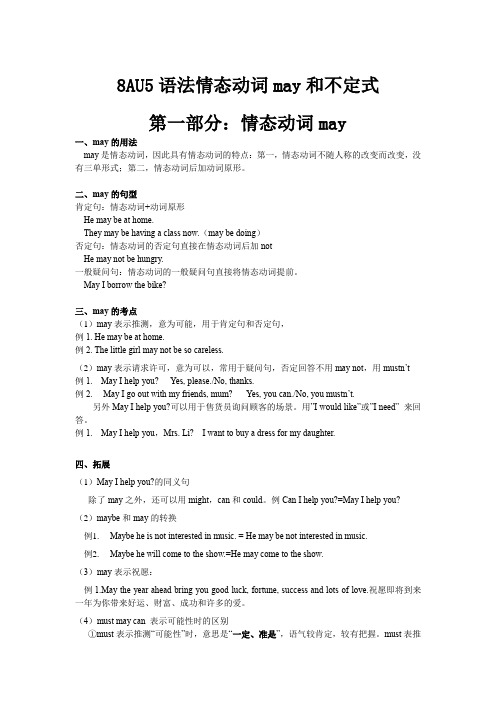
8AU5语法情态动词may和不定式第一部分:情态动词may一、may的用法may是情态动词,因此具有情态动词的特点:第一,情态动词不随人称的改变而改变,没有三单形式;第二,情态动词后加动词原形。
二、may的句型肯定句:情态动词+动词原形He may be at home.They may be having a class now.(may be doing)否定句:情态动词的否定句直接在情态动词后加notHe may not be hungry.一般疑问句:情态动词的一般疑问句直接将情态动词提前。
May I borrow the bike?三、may的考点(1)may表示推测,意为可能,用于肯定句和否定句,例1. He may be at home.例2. The little girl may not be so careless.(2)may表示请求许可,意为可以,常用于疑问句,否定回答不用may not,用mustn’t例1.---May I help you?----Yes, please./No, thanks.例2. ---May I go out with my friends, mum? ----Yes, you can./No, you mustn’t.另外May I help you?可以用于售货员询问顾客的场景。
用”I would like”或”I need” 来回答。
例1.---May I help you,Mrs. Li?---I want to buy a dress for my daughter.四、拓展(1)May I help you?的同义句除了may之外,还可以用might,can和could。
例Can I help you?=May I help you?(2)maybe和may的转换例1.Maybe he is not interested in music. = He may be not interested in music.例2.Maybe he will come to the show.=He may come to the show.(3)may表示祝愿:例1.May the year ahead bring you good luck, fortune, success and lots of love.祝愿即将到来一年为你带来好运、财富、成功和许多的爱。
may与might用法要点完全归纳

may与m ight用法要点完全归纳1. 表示允许(1)表示请求允许(即请求别人允许自己做某事),两者都可用,只是might 表示的语气较委婉(但并不表示过去)。
如:May I come round in the morning? 我早上来行吗?I wonder if I might use your phone. 不知可否用一下你的电话。
I’d like to ask a question if I may. 如果可以的话,我想提个问题。
(2)表示给予允许(即自己允许别人做某事),只用能may而不能用m ight。
如:You may stop now. 你现在可以停下来了。
You may leave when you’ve finished. 你做完以后就可以走。
You may not tell him this. 你不可以告诉他这件事。
体会以下对话的问句与答句:A:M ay [M ight]I stay? 我可以留下吗?(表请求,可用两者)B:Y es, you may. 可以。
(表允许,不能用might)注意,m ight 表示允许通常不表示过去,但是在间接引语(即宾语从句)中可以用作may 的过去式来转述已给予的允许。
如:She said that he might take her dictionary. 她说他可以拿她的词典去用。
2. 表示推测两者都可用,只是might 比may 语气更不确定,表示的可能性更小(注意此时的m ight并不表过去)。
在句型使用方面:m ay通常用于肯定句或否定陈述句,一般不用于疑问句(疑问句中用can, 参见can),而m ight 则可用于肯定句、否定句或疑问句。
在用法方面注意以下几点:(1)后接动词原形,表示对现在或将来的推测。
如:He may [m ight]be in his office now. 他现在说不定在办公室里。
may might的用法
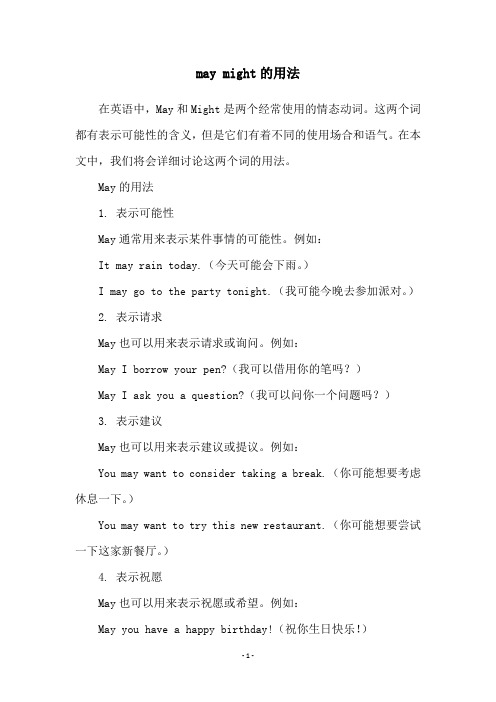
may might的用法在英语中,May和Might是两个经常使用的情态动词。
这两个词都有表示可能性的含义,但是它们有着不同的使用场合和语气。
在本文中,我们将会详细讨论这两个词的用法。
May的用法1. 表示可能性May通常用来表示某件事情的可能性。
例如:It may rain today.(今天可能会下雨。
)I may go to the party tonight.(我可能今晚去参加派对。
)2. 表示请求May也可以用来表示请求或询问。
例如:May I borrow your pen?(我可以借用你的笔吗?)May I ask you a question?(我可以问你一个问题吗?)3. 表示建议May也可以用来表示建议或提议。
例如:You may want to consider taking a break.(你可能想要考虑休息一下。
)You may want to try this new restaurant.(你可能想要尝试一下这家新餐厅。
)4. 表示祝愿May也可以用来表示祝愿或希望。
例如:May you have a happy birthday!(祝你生日快乐!)May your dreams come true!(愿你的梦想成真!)Might的用法1. 表示可能性Might也用来表示可能性,但是它的语气比May更加含糊。
例如: It might rain today.(今天可能会下雨。
)I might go to the party tonight.(我可能今晚去参加派对。
)2. 表示可能性的否定Might也可以用来表示否定的可能性。
例如:He might not come to the meeting.(他可能不会来参加会议。
) They might not be able to finish the project on time.(他们可能无法按时完成这个项目。
)3. 表示委婉的请求或建议Might也可以用来表示委婉的请求或建议。
牛津译林版英语8A Unit5-8语法综合归纳复习

牛津译林版英语8A Unit 5-8语法综合归纳复习8A Unit5语法复习:(一)may的用法may可以用来表示请求或给予许可,相当于can,但may比can更正式和礼貌.常用于请求陌生人及受尊敬的人的许可。
e.g: ①一May l smoke here?一Yes,you may.一No,You may not./ No,you mustn’t.② May I leave now? --- Certainly.③That bike may be David’s.【知识拓展】(1)may也可以用来表示猜测,意为“可能”。
(2) might表示更正式、更礼貌的请求,语气非常委婉。
值得注意的是,当might表示征询对方意见时,它不是may的过去式,由商量引起的问句进行回答时,通常用may。
--Might I go out to play games?--Yes,you may. --No,you may not./ I'm afraid not.EX:( )---I hear you’ve got a new iPhone 4S . I have a look?---Yes.certainly.A .May B. Do C .Shall D. Should(二)动词不定式作宾语1. 概述:动词不定式是动词的非谓语形式之一,其表现形式为:to+动词原形。
其中to是动词不定式符号,没有任何词义。
其否定形式是在to前面加not。
动词不定式有动词的特点,可以有自己的状语;若不定式动词是及物的,可以带自己的宾语.一起构成动词不定式短语。
2. 用法:动词不定式没有人称和数的变化,它具有名词、形容词和副词的特征,同时也保留了动词的某些特征,在句中可充当主语、表语、宾语、宾语补足语、定语以及目的状语等。
本单元介绍动词不定式作宾语的用法。
(1)常见的能带动词不定式作宾语的动词有:want,like,love,wish,hope,need,try,ask,seem,help,learn,decide,plan,start,begin,forget,remember,choose ,prepare,agree等。
may和might作情态动词的用法

may和might作情态动词的用法May和might作为情态动词有以下几种用法:1. 表示许可或请求:may或might用于表示向对方提出请求或询问是否有许可。
例如:- May I borrow your pen, please?(我可以借用你的钢笔吗?)- Might I ask you a question?(我可以问你个问题吗?)2. 表示可能性:may或might用于表示某事发生的可能性。
例如:- It may rain later.(可能会下雨)- He might be late for the meeting.(他可能会迟到会议)3. 表示建议或意见:may用于表示建议或给出主观意见。
例如:- You may want to double-check your work before submitting it.(在提交之前,你可能需要再检查一下你的工作。
)4. 表示推测或假设:may或might用于表示推测或假设。
通常用于以"可能"的形式表示对过去或现在的不确定性。
例如:- He may/might have forgotten the meeting time.(他可能忘记了会议时间。
)- She may/might be studying in her room now.(她可能现在正在她的房间里学习。
)需要注意的是,may和might在表达可能性和推测时的区别非常细微,但might在口语中更常用于推测和假设。
另外,may 和might在否定句和疑问句中使用时没有区别,例如:- You may not bring your own food into the theater.(你不能把自己的食物带进剧院。
)- May/Might I come in?(我可以进来吗?)。
情态动词may和might的用法和例句_情态动词 英语语法.doc
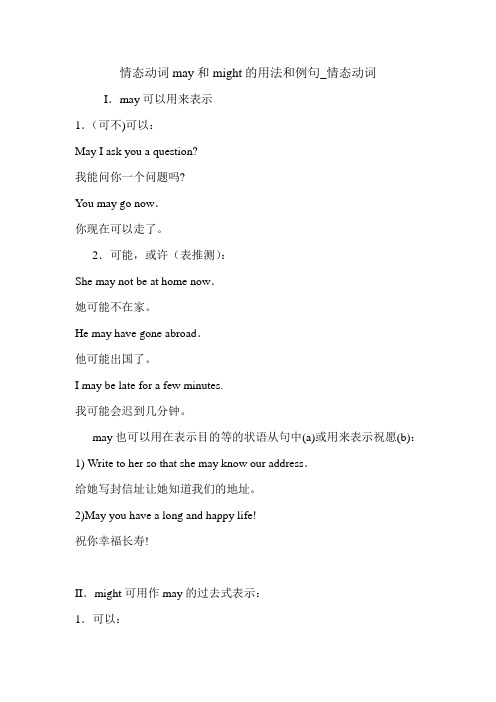
情态动词may和might的用法和例句_情态动词I.may可以用来表示1.(可不)可以:May I ask you a question?我能问你一个问题吗?You may go now.你现在可以走了。
2.可能,或许(表推测):She may not be at home now.她可能不在家。
He may have gone abroad.他可能出国了。
I may be late for a few minutes.我可能会迟到几分钟。
may也可以用在表示目的等的状语从句中(a)或用来表示祝愿(b):1) Write to her so that she may know our address.给她写封信址让她知道我们的地址。
2)May you have a long and happy life!祝你幸福长寿!II.might可用作may的过去式表示:1.可以:He a sked whether he might use our phone.他问可否用我们的电话。
He thought he might have a try.他想他可以试一试。
2.可能,或许:I thought mother might like the idea.我想妈可能会赞成这个想法。
She was afraid he might not agree.她怕他或许不赞成。
might也可用来代替may,使口气显得更委婉或不肯定,表示:1)可以:Might I have a cup of coffee?我可否要一杯咖啡。
You might sit by my side.你可以坐我旁边。
2)可能,或许:The paper says that it might rain.报纸说可能要下雨。
She might have forgotten about it.她或许忘了这件事。
此外还可用在某些从句中(a)或条件句中(b):a.He died so that others might live.他死了使别人能活下来。
may与might的用法比较与说明
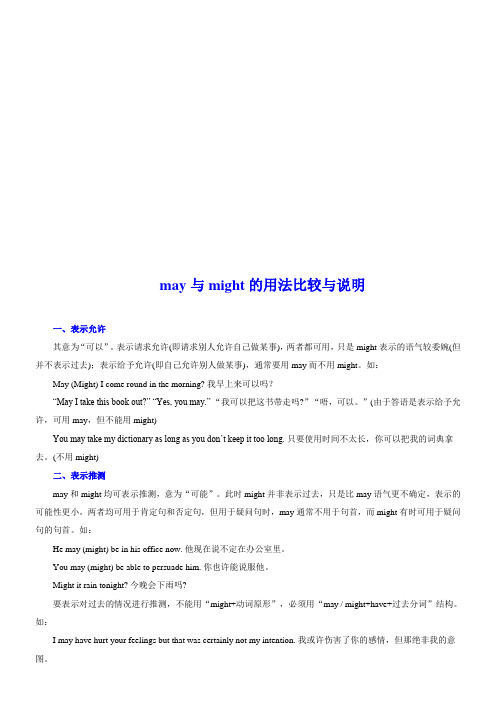
may与might的用法比较与说明一、表示允许其意为“可以”。
表示请求允许(即请求别人允许自己做某事),两者都可用,只是 might 表示的语气较委婉(但并不表示过去);表示给予允许(即自己允许别人做某事),通常要用 may而不用might。
如:May (Might) I come round in the morning? 我早上来可以吗?“May I take this book out?” “Yes, you may.”“我可以把这书带走吗?”“唔,可以。
”(由于答语是表示给予允许,可用 may,但不能用 might)You may take my dictionary as long as you don’t keep it too long.只要使用时间不太长,你可以把我的词典拿去。
(不用might)二、表示推测may 和 might 均可表示推测,意为“可能”。
此时 might 并非表示过去,只是比 may 语气更不确定,表示的可能性更小。
两者均可用于肯定句和否定句,但用于疑问句时,may 通常不用于句首,而 might 有时可用于疑问句的句首。
如:He may (might) be in his office now. 他现在说不定在办公室里。
You may (might) be able to persuade him. 你也许能说服他。
Might it rain tonight? 今晚会下雨吗?要表示对过去的情况进行推测,不能用“might+动词原形”,必须用“may / might+have+过去分词”结构。
如:I may have hurt your feelings but that was certainly not my intention. 我或许伤害了你的感情,但那绝非我的意图。
There may (might) have been someone waiting outside. 可能曾有人在外面等候。
may与might的区别今天终于弄清楚了!

may与might的区别今天终于弄清楚了!作为情态动词,大家都知道might是may的过去式,但可能很多人不知道的是,may和might还存在诸多差别。
一、may的用法may主要有三种用法:1、表示可能性(to talk about a possible situation),如:•Those reports may prove to be false.•The chorus may look silly, but theysound wonderful.2、表示请求许可(to politely give or ask for permission to do something),如:•May we come in?•That's all for now, you may go.3、表达祝愿或希望(to express a wish or hope),如:•May they be very happy in the future.•May you succeed in the coming year.二、may与might的区别might在语法形式上,是may的过去式。
所以,如果要表达对现在或未来的猜测的话,一般要用may;而要表达对过去的猜测的话,则要用might。
如:•It may take a long time to find asolution to the problem.•He devised a plan wherebyhe might escape.然而,这种差别在当代英语中越来越小——无论是表达对什么时间的猜测,may和might都可以。
如:•对将来的猜测She thinks she may be going crazy.She thinks she might be going crazy.•对过去的猜测I mighthave forgotten to mention it atthe time.I may have forgotten to mention it atthe time.那么,may和might到底有什么差别呢?(一)may have与might have如果在说话或写作的时候,不知道过去发生的事情的真相,那么may have和might have都可以。
初二上学期英语unit5重点语法牛津版
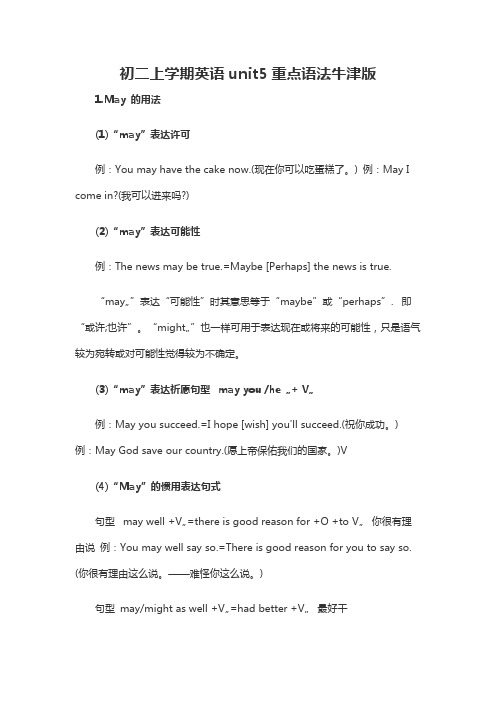
初二上学期英语unit5重点语法牛津版1.May 的用法(1)“may”表达许可例:You may have the cake now.(现在你可以吃蛋糕了。
) 例:May I come in?(我可以进来吗?)(2)“may”表达可能性例:The news may be true.=Maybe [Perhaps] the news is true.“may…”表达“可能性”时其意思等于“maybe”或“perhaps”. 即“或许;也许”。
“might…”也一样可用于表达现在或将来的可能性,只是语气较为宛转或对可能性觉得较为不确定。
(3)“may”表达祈愿句型 may you /he …+ V…例:May you succeed.=I hope [wish] you'll succeed.(祝你成功。
) 例:May God save our country.(愿上帝保佑我们的国家。
)V(4)“May”的惯用表达句式句型 may well +V…=there is good reason for +O +to V…你很有理由说例:You may well say so.=There is good reason for you to say so. (你很有理由这么说。
——难怪你这么说。
)句型may/might as well +V…=had better +V…最好干例:We may [might] as well start at once.=We had better start at once. (我们最好立刻动身吧。
)2. 动词不定式作宾语to do 形式I want to eat ice ream.My sister decides to buy a new bike. 这一类常见动词:agree(同意),choose(选择)decide(决定)forget(忘记)hope(希望)learn(学习)like(喜欢)plan(计划)prepare(准备)promise(答应)refuse(拒绝)remember(记得)seem(觉得好像)want(想要)wish(希望)would like (想要)3.后缀ing, ness , ion 将动词或形容词变成名词mean—meaning feel—feeling meet—meeting hunt—hunting begin—beginning shop—shopping ill—illness kind—kindness sick—sickness dark—darkness sad—sadness happy—happiness act—action discuss—discussion protect—protection decide—decision invite—invitation celebrate—celebration。
Unit 5 Grammar2021-2022学年牛津译林版八上
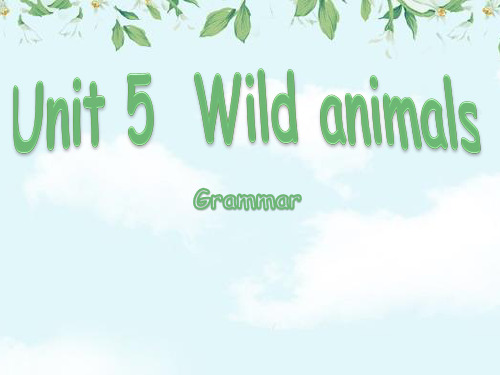
Dad: Do you know anything special about wild animals?
Amy: Yes, Dad. For example, dolphins are clever. They can __le_a_r_n__to__w_o_r_k__o_u_t__ easy maths problems.
Amy: Yes. Bees always _r_e_m_e_m__b_e_r_t_o_c_o_m__e_b_a_c_k__ the same way as they went.
Dad: What do you know about squirrels? Amy: They always __b_e_g_in__t_o_s_a_v_e____ some food
4. 情态动词表示猜测时: must >can >may(按语气的强烈程度) must “一定”,只能用于肯定句中 can “很可能”,只用于否定句和疑问句中 may表示“可能”,用于肯定句和否定句中
1. ---Do you have any plans for this weekend?
---I’m not sure. I _____ go climbing.
may not“可能不”; can’t “不可能”
Millie is in the zoo. She is telling Sandy on the phone about what happens. Complete what Millie says using may with the words in brackets.
A. May B. Would C. Do
5. ---How nice the building is! what’s it for?
牛津译林版英语8A Unit 5 重点短语和句子

牛津课本八年级 U5 重点知识归纳一、词组或短语1. 生活在野外2. 不可能 l ive in the wi ld no way3. 同情穷人 have / t ake p i ty on poor peop lein fac t4. 实际上,事实上5. 动物世界之王6. 称他为圣诞老人7.看起来像只白老鼠8.重 100 克 the k ings o f the an i mal wor ldca l l h im Fa ther Chr i s tmaslook l ike a whi te mouseweigh 100 g rams9.开始第一次走出她的家门 10.不再… s ta r t to go ou t s ide her home for the f i r s t t imenot… any more11.一开始 in the beg inn ing12.面对严重的问题 face se r ious p rob lems13.主要以吃一种特殊的竹子为生 live main ly on a spec ia l k ind o f bamboo14.因此 as a resu l t15.有住的地方 have a p lace to l ive(be) in danger16.处在危险之中 17.采取措施干某事 18.立刻,马上 t ake ac t ion to do s t hr igh t away=a t oncebui ld more panda r eservesmake l aws to p ro tec t pandasl ea rn to look a f t e r herse l fcome in to the wor l d as a babyge t s i ck19.建造更多的熊猫保护区 20.制定法律保护熊猫 21.学会照顾她自己 22.出生/ 出世 23.生病 24.出生时,诞生时 25.半年 a t b i r thha l f a year26.害怕做某事 be a f ra id o f do ing s ths leep with one’s eyes closedget lost=lose one’s waywork ou t a maths prob lemwork i t /them ou t27.闭着眼睛睡觉 28.迷路 29.解答一道数学题 30.解决它/它们 31.在老师的帮助下 32.与…同样 with the he lp o f the t eacherthe same ---as33.一会儿 fo r a shor t whi le34.捉老虎取它们的皮毛和骨头 35.身体的其它部分 36.以团队形式一起工作 37.对人有危险 ca tch t ige r s fo r thei r fu r and bonesother pa r t s o f the bodywork as a t eambe dangerous to humansfewer and fewer l i ving a reaski l l fo r fun38.越来越少的生存区域 39.为取乐而杀害 40.失去生命 lose one’s life=dieneed our p ro tec t ion41.需要我们的保护42.有快乐和悲伤的感觉 43.谢谢你的好意 have fee l ings o f happiness and sadnessthank you fo r your kindnessaccep t our inv i ta t ion44.接受我们的邀请 45.一份有关处于危险中的动物的报告 a repor t on an an i mal in dangerm ove a round s lowlyin the day t imes leep th rough the winte r46.四周慢慢地走走 47.在白天 48.整个冬天睡觉 二、重点句子及句型:1. 你愿意生活在野外吗?W ould you l ike to l ive in the wi ld?2.你最喜欢什么野生动物?(2 种)W hat wi ld an imal do you l ike bes t? = What i s your favor i t e wi ld an imal?3. 当“希望”出生时,她只有 100 克。
Unit+5表可能性和动词不定式作宾语-2023-2024学年八年级英语上册(牛津译林版)
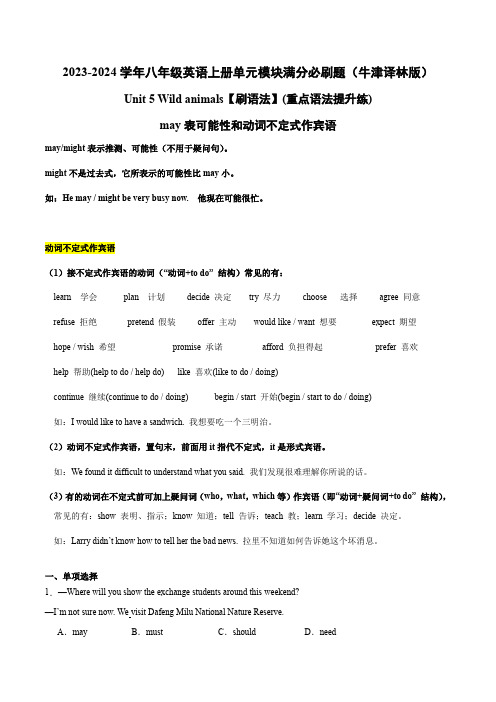
2023-2024学年八年级英语上册单元模块满分必刷题(牛津译林版)Unit 5 Wild animals【刷语法】(重点语法提升练)may表可能性和动词不定式作宾语may/might表示推测、可能性(不用于疑问句)。
might不是过去式,它所表示的可能性比may小。
如:He may / might be very busy now. 他现在可能很忙。
动词不定式作宾语(1)接不定式作宾语的动词(“动词+to do” 结构)常见的有:learn 学会plan 计划decide 决定try 尽力choose 选择agree 同意refuse 拒绝pretend 假装offer 主动would like / want 想要expect 期望hope / wish 希望promise 承诺afford 负担得起prefer 喜欢help 帮助(help to do / help do) like 喜欢(like to do / doing)continue 继续(continue to do / doing) begin / start 开始(begin / start to do / doing)如:I would like to have a sandwich. 我想要吃一个三明治。
(2)动词不定式作宾语,置句末,前面用it指代不定式,it是形式宾语。
如:We found it difficult to understand what you said. 我们发现很难理解你所说的话。
(3)有的动词在不定式前可加上疑问词(who,what,which等)作宾语(即“动词+疑问词+to do” 结构),常见的有:show 表明、指示;know 知道;tell 告诉;teach 教;learn 学习;decide 决定。
如:Larry didn’t know how to tell her the bad news. 拉里不知道如何告诉她这个坏消息。
译林版八年级上册 Unit5语法讲解

译林版八年级上册Unit5语法讲解(一)情态动词【知识点1】情态动词的基本概念情态动词是一种本身有一定的词义,表示说话人的情绪,态度或语气的动词,但不能单独作谓语,只能和其他动词的原形构成谓语。
情态动词主要有下列:can (could), may (might), must, need, shall (should), will (would)。
【知识点2】情态动词的特征1、有一定的词义,但不能单独做谓语,必须和行为动词和系动词连用构成谓语。
2、无人称和数的变化(have to例外,如在一般现在时态下用于第三人称单数时用has to)。
3、后接动词原形,即不带to的不定式。
4、具有助动词的作用,可用来构成否定句、疑问句及用于简单答语。
例:① I cannot swim very well.① —Can you swim very well? — Yes, I can. / No, I can’t.【知识点3】can1、can表示能力例:I can speak a little Japanese.(我会说一点儿日语。
)2、can表示允许,准许,这时can与may可以互换例:---Can/May I borrow your bike tomorrow? 明天我可以借你的自行车吗?---Yes, of course. You can/may use my bike tomorrow. 当然可以。
明天你可以用我的自行车。
3、can表示客观可能性,用在否定句和疑问句中表示猜测。
例:①He cannot/can’t be there. 他不可能在那儿。
②Can this news be true ? 这消息可能真实吗?4、could是can的过去式,在口语中经常代替can,表示非常委婉的请求。
这时could和can没有时间上的差别。
例:①Could/Can you tell me if he will go tomorrow? 你能告诉我他明天是否去吗?②Could/Can I ask you something if you are not busy? 如果您不太忙,我能否问您一些事情?【知识点4】may和might1、may表示“准许”和“许可”,这时可与can替换。
牛津译林版-英语-八上-5单元 语法点拨:情态动词may表示可能性的用法
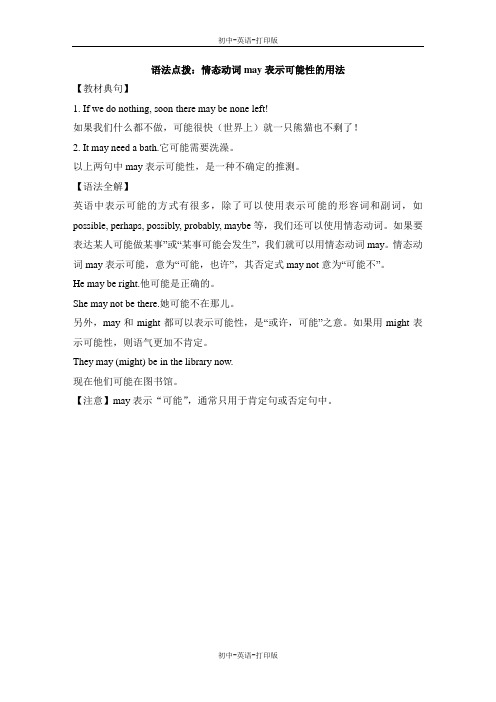
初中-英语-打印版
语法点拨:情态动词may表示可能性的用法
【教材典句】
1. If we do nothing, soon there may be none left!
如果我们什么都不做,可能很快(世界上)就一只熊猫也不剩了!
2. It may need a bath.它可能需要洗澡。
以上两句中may表示可能性,是一种不确定的推测。
【语法全解】
英语中表示可能的方式有很多,除了可以使用表示可能的形容词和副词,如possible, perhaps, possibly, probably, maybe等,我们还可以使用情态动词。
如果要表达某人可能做某事”或“某事可能会发生”,我们就可以用情态动词may。
情态动词may表示可能,意为“可能,也许”,其否定式may not意为“可能不”。
He may be right.他可能是正确的。
She may not be there.她可能不在那儿。
另外,may和might都可以表示可能性,是“或许,可能”之意。
如果用might表示可能性,则语气更加不肯定。
They may (might) be in the library now.
现在他们可能在图书馆。
【注意】may表示“可能”,通常只用于肯定句或否定句中。
初中-英语-打印版。
may与might用法详解

may与might用法详解一、表示允许(1)表示请求允许(即请求别人允许自己做某事),两者都可用,只是might 表示的语气较委婉(但并不表示过去):May I come round in the morning? 我早上来可以吗?Might I have a little brandy? 我可以喝点白兰地吗?I asked her if I might call and see her. 我问她我可否来看她。
I’d like to ask a question if I may. 如果可以的话,我想提个问题。
(2)表示给予允许(即自己允许别人做某事),通常要用may而不用might:You may leave whenever you please. 你高兴随时可以走。
You may go or stay, according as you decide. 是去是留由你自己决定。
You may use the room so long as you keep it clean. 你可以使用这个房间,只要你能保持干净。
体会以下对话的问句与答句:A:May [Might] I stay? 我可以留下吗? (表请求,可用两者)B:Yes, you may. 可以。
(表允许,不能用might)【注】在通常情况下,may 表示允许(请求允许或给予允许)时,总是针对“现在”或“将来”而言,若要表示已经给予或已经存在的允许,则通常不用may,而用can:Nowadays, children can do what they like. 现在小孩子喜欢干什么就可以干什么。
It’s unfair. He can stay and I have to leave. 这不公平,他可以留下,而我却得离开。
例外的情况是,might用于间接引语和may 用于否定句表示禁止:He said that I might borrow his car. 他说我可以用他的车。
Unit5知识点讲解牛津译林版英语八年级上册

八上第五单元知识点讲解1.知识目标:学生能够掌握第五单元的短语和词汇。
2.技能目标:学生能够掌握情态动词may的用法。
3.情感目标:学生能够养成保护野生动物的意识。
1.情态动词may的用法。
ic&Wele to the unit知识点1.Would you like to live in the wild,Eddie?你想住在野外吗?【用法详解】(1)wild表示“自然环境,野生状态”in the wild表示“在野外”。
(2)wild还可以表示“野生的” 例如:wild animals。
Eg.1.Can the baby pandas live in the wild on their own?熊猫宝宝能够独自在野外生存吗?2.In those days we often went to dig for wild vegetables.那时候我们常常出去挖野菜。
【典例讲解】1.If animals stay in the ____ (野外),they will be free.2.I don't think the animals should be kept in the zoo,but if they live in the _______, we have no chance to see them.3.它们在野外露营。
(翻译为英文)_______________________________________________________________________________ ____知识点2.So could you please not eat them?因此请你不要吃它们好吗?【用法详解】Can/Could you please.?此句型用来表示请求别人做某事,意思是“请你……,好吗?”。
could 是can的过去式,但在本句型中并不表示时间上的区别,而只是语气上的不同。
may与might的用法区别电子版本

m a y与m i g h t的用法区别may与might的用法区别一、表示允许注意以下两种情况。
如:1. 表示请求允许(即请求别人允许自己做某事),两者都可用,只是 might 表示的语气较委婉(但并不表示过去)。
如:May [Might] I sit here? 我可以坐在这里吗?I wonder if I might ask you a favor? 不知能否请你帮个忙?I’d like to ask a question if I may. 如果可以的话,我想提个问题。
2. 表示给予允许(即自己允许别人做某事),通常要用 may而不用might。
如:You may come in now. 你现在可以进来了。
You may not tell him this. 你不可以告诉他这件事。
体会以下对话的问句与答句。
如:A:May [Might] I stay? 我可以留下吗? (表请求,可用两者)B:Yes, you may. 可以。
(表允许,不能用 might)注:在通常情况下,may 表示允许(请求允许或给予允许)时,总是针对“现在”或“将来”而言,若要表示已经给予或已经存在的允许,则通常不用 may,而用can。
如:Nowadays, children can do what they like. 现在小孩子喜欢干什么就可以干什么It’s unfair. He can stay and I have to leave. 这不公平,他可以留下,而我却得离开。
例外的情况是,might用于间接引语和 may 用于否定句表示禁止。
如:He said that I might borrow his car. 他说我可以用他的车。
Visitors may not (=must not) feed the animals. 参观者不得给动物喂食。
二、表示推测两者都可用,只是 might 比 may 语气更不确定,表示的可能性更小。
may和might的用法辨析
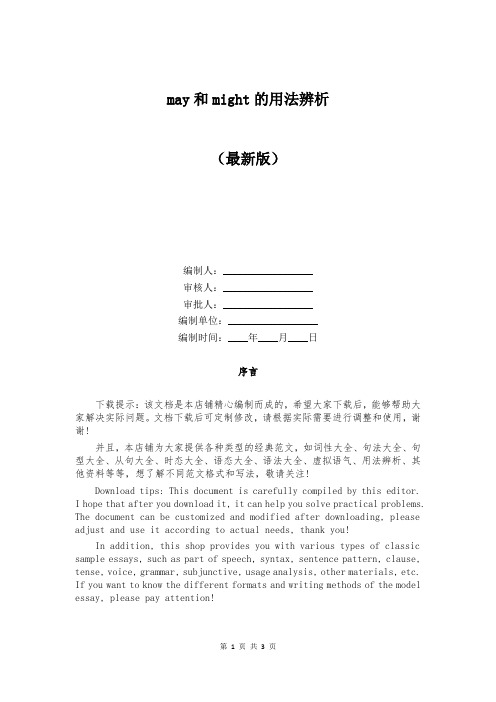
may和might的用法辨析(最新版)编制人:__________________审核人:__________________审批人:__________________编制单位:__________________编制时间:____年____月____日序言下载提示:该文档是本店铺精心编制而成的,希望大家下载后,能够帮助大家解决实际问题。
文档下载后可定制修改,请根据实际需要进行调整和使用,谢谢!并且,本店铺为大家提供各种类型的经典范文,如词性大全、句法大全、句型大全、从句大全、时态大全、语态大全、语法大全、虚拟语气、用法辨析、其他资料等等,想了解不同范文格式和写法,敬请关注!Download tips: This document is carefully compiled by this editor.I hope that after you download it, it can help you solve practical problems. The document can be customized and modified after downloading, please adjust and use it according to actual needs, thank you!In addition, this shop provides you with various types of classic sample essays, such as part of speech, syntax, sentence pattern, clause, tense, voice, grammar, subjunctive, usage analysis, other materials, etc. If you want to know the different formats and writing methods of the model essay, please pay attention!may和might的用法辨析may和might可以表示可能性和许可。
- 1、下载文档前请自行甄别文档内容的完整性,平台不提供额外的编辑、内容补充、找答案等附加服务。
- 2、"仅部分预览"的文档,不可在线预览部分如存在完整性等问题,可反馈申请退款(可完整预览的文档不适用该条件!)。
- 3、如文档侵犯您的权益,请联系客服反馈,我们会尽快为您处理(人工客服工作时间:9:00-18:30)。
语法讲解:may和might的用法1
■表示请求允许:可以
—May/Might/Can I come in? 我可以进来吗?
—Yes, please. 请。
He said I might borrow his car. 他说我可以借他的车。
注意:前例中的might不是过去式,只是更婉转;但在后例这样主句动词是过去式的句子里,might可看作是may的过去式。
■表示给予允许:可以
You may bring it back tomorrow. 你可以明天把它带来。
You may not go there. 你不可以去那里。
注意:1. 表示给予允许,不能用might;2. 常用来回答表示不允许。
如:—Might I go now?我可以去吗?
—Yes, you may. 可以。
—No, you mustn’t/can’t. 不可以去。
—You’d better not. 你最好不去。
■表示祝愿
May you succeed! 祝你成功!
May you live happily. 祝你生活幸福!
■表示推测:可能
It may/might rain this afternoon. 今天下午可能会下雨
He may come, or he may not. 他可能来,也可能不来。
She may still be waiting for us. 她可能还在等我。
注意:
1. 作此种用法时,也可用might(不是过去式) 语气更委婉;若是对过去情况的推测,用may/might have加过去分词。
如:
You may/might have helped me when I asked you. 我请你帮忙时,你本可以帮我的。
2. 表示推测时,may not意为“可能不”,can’t意为“不可能”,前者较后者语气弱得多。
如:
He may not come today, for it’s raining. 今天他可能不会来,因为在下雨。
He cannot come today, for he has gone to America. 他今天不可能来,因为他去美国了。
may, might表示允许和推测的用法
1. may, might表示允许
表示现在的允许时,若是请求别人允许自己做某事,两者均可用,但用might 语气更委婉;若是自己允许别人做某事,一般只用may,而不用might。
如:May I come in? 我可以进来吗?
“May I use your pen? ” “Yes, of course you may.” “我可以借用你的钢笔吗?”“当然可以。
”(不能说Yes, you might.)
注:在通常情况下,may 表示允许(请求允许或给予允许)时,总是针对“现在”或“将来”而言,若要表示已经给予或已经存在的允许,则通常不用may,而用can:Nowadays, children can do what they like. 现在小孩子喜欢干什么就可以干什么。
2. may, might表示推测
两者都可用,只是might 比may 语气更不确定,表示的可能性更小。
若推测现在的情况,后接动词原形;若推测正在进行的情况,后接动词进行式;若推测过去的情况,后接动词的完成式。
如:
He may not be there. 他可能不在那里。
He may be waiting for someone. 他可能等人。
They may have seen him. 他们可能见到过他(from )。
注:might 后接动词的完成式,除表示对过去的推测外,还可表示过去某事可能发生而实际上却并没发生或表示委婉的批评或责备(此时不用may)。
如:
You might have let me know before! 你要是早点让我知道就好了!
A lot of men died who might have been saved.很多人本来可以获救的却死了。
